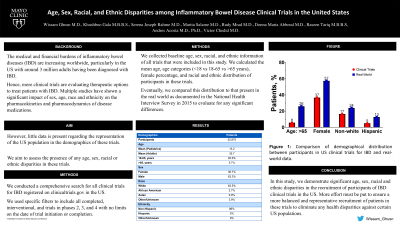Monday Poster Session
Category: IBD
P2168 - Disparities in Age, Sex, Race, and Ethnicity in Clinical Trials Focused on Inflammatory Bowel Disease in the United States
Monday, October 23, 2023
10:30 AM - 4:15 PM PT
Location: Exhibit Hall

Has Audio

Wissam Ghusn, MD
Mayo Clinic
Boston, MA
Presenting Author(s)
Wissam Ghusn, MD, Khushboo Gala, MBBS, Serena Joseph Rahme, MD, Marita Salame, MD, Rudy Mrad, MD, Donna Maria Abboud, MD, Raseen Tariq, MBBS, Andres Acosta, MD, PhD, Victor Chedid, MD, MS
Mayo Clinic, Rochester, MN
Introduction: The medical and financial burden of inflammatory bowel diseases (IBD) is increasing globally, particularly in the US with a prevalence of around 3 million adults. The number of clinical trials evaluating therapeutic options for IBD are increasing rapidly, but data on the representation of the US population in the demographics of these trials is lacking. We aim to assess the disparities in age, sex, race, and ethnicity in these trials.
Methods: We conducted a comprehensive search for all clinical trials for IBD registered on clinicaltrials.gov in the US. We used specific filters to include all completed, interventional, and trials in phases 2, 3, and 4 with no limits on the date of trial initiation or completion. We collected baseline age, sex, race, and ethnicity data from all trials that were included in this study. We calculated the mean age, age categories (< 18 vs 18-65 vs >65 years), female percentage, and racial and ethnic distribution of participants in these trials. We compared the distributions to the National Health Interview Survey in 2015, which we labeled as “real-world data”, to evaluate for any significant differences.
Results: We included a total of 151 different IBD trials that were conducted in the US at any time period between 2002-2023 (69 for Crohn’s Disease, 73 for Ulcerative Colitis, and 9 for both). In these trials, we had a total of 52,975 patients. The mean age was 31.0 years for all patients; 13.3 years in trials for pediatric patients and 35.7 years for trials with adult patients. In trials reporting the age categories, there were 92% of patients between 18-65 years, and only 5.7% above 65 years of age compared to 26% of patients with an age > 65 years in the real world. Trials included 36.7% female participants, compared to 57.4% reported in the real-world data. In our review, 83.5% of all patients were White, with only 2.7% being African American compared to 5% in the real world. All other races constituted less than 1% of the patients in these trials. Finally, on comparing ethnicity 86% of the recruited patients were non-Hispanic, 5% were Hispanic compared to 12.7% documented in the US, and the rest were of unknown/documented ethnicity (Figure 1).
Discussion: In this study, we demonstrate significant disparities in age, sex, race, and ethnicity in the recruitment of participants to IBD clinical trials in the US. Diverse recruitment strategies will allow for more representative populations that may reduce disparities in future IBD care and guidelines.

Disclosures:
Wissam Ghusn, MD, Khushboo Gala, MBBS, Serena Joseph Rahme, MD, Marita Salame, MD, Rudy Mrad, MD, Donna Maria Abboud, MD, Raseen Tariq, MBBS, Andres Acosta, MD, PhD, Victor Chedid, MD, MS. P2168 - Disparities in Age, Sex, Race, and Ethnicity in Clinical Trials Focused on Inflammatory Bowel Disease in the United States, ACG 2023 Annual Scientific Meeting Abstracts. Vancouver, BC, Canada: American College of Gastroenterology.
Mayo Clinic, Rochester, MN
Introduction: The medical and financial burden of inflammatory bowel diseases (IBD) is increasing globally, particularly in the US with a prevalence of around 3 million adults. The number of clinical trials evaluating therapeutic options for IBD are increasing rapidly, but data on the representation of the US population in the demographics of these trials is lacking. We aim to assess the disparities in age, sex, race, and ethnicity in these trials.
Methods: We conducted a comprehensive search for all clinical trials for IBD registered on clinicaltrials.gov in the US. We used specific filters to include all completed, interventional, and trials in phases 2, 3, and 4 with no limits on the date of trial initiation or completion. We collected baseline age, sex, race, and ethnicity data from all trials that were included in this study. We calculated the mean age, age categories (< 18 vs 18-65 vs >65 years), female percentage, and racial and ethnic distribution of participants in these trials. We compared the distributions to the National Health Interview Survey in 2015, which we labeled as “real-world data”, to evaluate for any significant differences.
Results: We included a total of 151 different IBD trials that were conducted in the US at any time period between 2002-2023 (69 for Crohn’s Disease, 73 for Ulcerative Colitis, and 9 for both). In these trials, we had a total of 52,975 patients. The mean age was 31.0 years for all patients; 13.3 years in trials for pediatric patients and 35.7 years for trials with adult patients. In trials reporting the age categories, there were 92% of patients between 18-65 years, and only 5.7% above 65 years of age compared to 26% of patients with an age > 65 years in the real world. Trials included 36.7% female participants, compared to 57.4% reported in the real-world data. In our review, 83.5% of all patients were White, with only 2.7% being African American compared to 5% in the real world. All other races constituted less than 1% of the patients in these trials. Finally, on comparing ethnicity 86% of the recruited patients were non-Hispanic, 5% were Hispanic compared to 12.7% documented in the US, and the rest were of unknown/documented ethnicity (Figure 1).
Discussion: In this study, we demonstrate significant disparities in age, sex, race, and ethnicity in the recruitment of participants to IBD clinical trials in the US. Diverse recruitment strategies will allow for more representative populations that may reduce disparities in future IBD care and guidelines.

Figure: Figure 1: Comparison of demographical distribution between participants in US clinical trials for IBD and real-world data.
Disclosures:
Wissam Ghusn indicated no relevant financial relationships.
Khushboo Gala indicated no relevant financial relationships.
Serena Joseph Rahme indicated no relevant financial relationships.
Marita Salame indicated no relevant financial relationships.
Rudy Mrad indicated no relevant financial relationships.
Donna Maria Abboud indicated no relevant financial relationships.
Raseen Tariq indicated no relevant financial relationships.
Andres Acosta: Amgen Pharmaceuticals – Consultant. General Mills – Consultant. Gila Therapeutics – Stock-privately held company. Phenomix Sciences – Stock-privately held company. Rhythm Pharmaceuticals – Consultant.
Victor Chedid indicated no relevant financial relationships.
Wissam Ghusn, MD, Khushboo Gala, MBBS, Serena Joseph Rahme, MD, Marita Salame, MD, Rudy Mrad, MD, Donna Maria Abboud, MD, Raseen Tariq, MBBS, Andres Acosta, MD, PhD, Victor Chedid, MD, MS. P2168 - Disparities in Age, Sex, Race, and Ethnicity in Clinical Trials Focused on Inflammatory Bowel Disease in the United States, ACG 2023 Annual Scientific Meeting Abstracts. Vancouver, BC, Canada: American College of Gastroenterology.
